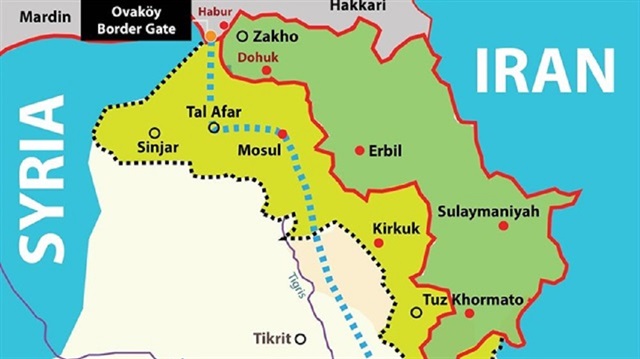
The US has begun to put pressure on the Iraqi government to sabotage the joint Turkey-Iraq Ovaköy border gate project
The Ovaköy border gate project is being delayed due to U.S. pressures on the Iraqi government although Ankara and Baghdad had reached a consensus regarding the matter.
The border gate, an alternative to the Ibrahim Khalil (Habur) border crossing located between Turkey and the Kurdish region in northern Iraq, will cut off the weapons supply of the Kurdistan Workers’ Party (PKK) terror group.
Washington, which is currently using the Ibrahim Khalil border crossing to supply weapons to terrorists from the PKK in Syria, is afraid of losing its terror card in the region and trying to force the Iraqi administration to stop the Ovaköy Border Gate project.
The Ovaköy line will start from the bottom of the Syrian border in the west of Habur, passing near Turkmen and Arab regions and will enable goods and services to be delivered directly to Baghdad.
The 120-kilometer stabilized road to be used for connection to the main road from Mosul will become an international trade route.
Turkey first announced the Ovaköy gate project at the end of 2017, after it shut down the main border crossing Habur in response to the Kurdistan Regional Government (KRG)'s independence referendum on Sept. 25.
Speaking to Yeni Şafak daily, Prof Dr. Mahir Nakip, head of international relations at Çankaya University and originally from Kirkuk, said, “The U.S. is blocking this project fearing the loss of its terror card.”
The U.S has supplied the PKK/PYD terror organization with more than 5,000 truckloads of weapons to allegedly use in the fight against Daesh, despite Ankara’s warnings that the group is the Syrian offshoot of the PKK terror organization.
Nakip stated that after the opening of the new border gate and closure of Habur, the Sinjar mountains, which was being prepared as an alternative base for PKK terrorists, will be bypassed.
The U.S. had already prepared a deployment in Sinjar aimed at establishing a military base on the mountain where the PKK terrorist group is still present in the region under the name of the Sinjar Resistance Units (YBŞ).
The PKK is listed as a terrorist organization by Turkey, the European Union and the United States. The PKK has been conducting armed violence in the southeastern part of Turkey since 1984. More than 40,000 people, mostly civilians, have been killed in the three-decade long conflict.
“The opening of the Ovaköy trade gate would be the best answer to the U.S. which has started to economically blackmail Turkey,” Nakip said.
Turkey and the U.S. are currently experiencing rocky relations following Washington’s imposition of sanctions on Interior Minister Süleyman Soylu and Justice Minister Abdülhamit Gül for not releasing American Pastor Andrew Brunson, who faces terrorism charges in Turkey.
U.S. President Donald Trump on Friday ramped up his attack on Turkey by doubling U.S. tariffs on Turkish aluminum and steel imports to 20 percent and 50 percent, respectively.
Stressing that the Ovaköy border gate was significant to break the political, military and economic siege trying divide Turkey from the Muslim world, Prof. Nakip said, “This gate as an operation will be the starting point of a new movement extending from Iraq to the Muslim world. Iraqi Arabs, Turkmens and Kurds support Turkey a hundred percent for the opening of this crossing point. Feasibility studies on the construction of the whole border and the new bridge across Habur River have been completed and will be launched when the line starts to operate. Turkey has undertaken the construction of this bridge.”
He also underlined that Kurdistan Regional Government (KRG) leader Barzani gained more than 600 million dollars annually from the Habur gate because it is the only trade route between Iraq and Turkey.
Hello, the comments you share on our site are a valuable resource for other users. Please respect other users and different opinions. Do not use rude, offensive, derogatory, or discriminatory language.
The floor is all yours.












